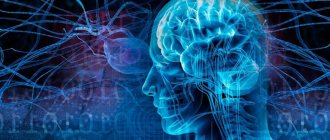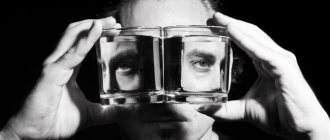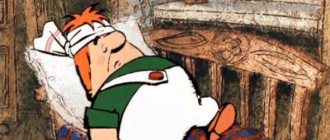Signs and symptoms of astheno-neurotic syndrome
The syndrome is manifested by physical fatigue, weakness, inability to engage in long-term physical and mental exercise, and increased irritability. A diagnosis can be suspected if the following clinical picture is observed: pronounced disorders of the autonomic nervous system; nonspecific subjective complaints about disturbances in the functioning of various organs; in some cases, in reality, there may be minor changes in their functions (for example, flatulence, hiccups). However, in general, the functioning of organs and systems is preserved. People of a hysterical disposition are especially susceptible to the manifestation of the syndrome.
In general, the symptoms of astheno-neurotic syndrome can be divided into:
- Somatovegetative disorders: dizziness, rapid heartbeat, chest pain, shortness of breath, feeling of lack of air or a lump in the throat, hand tremors, muscle spasms, sweating, nausea, stomach discomfort, frequent urge to urinate. These manifestations are often combined with phobias and anxiety.
- Somatoform disorders: complaints of various symptoms of diseases (short-term pain, burning, etc.), craving for new medical examinations in the absence of real pathologies.
Treatment of stress and depression: anti-anxiety medications
In the treatment of depression, drugs that differ in the active substance are used. They can be natural, plant-based or created in laboratory conditions, affecting brain receptors. An experienced psychotherapist will tell you which medicine to use in a particular case.
Antidepressants are divided according to the principle of their effect on the human body into the following types:
- stimulants
- balanced action drugs
- sedatives
Such drugs are sold strictly according to a doctor's prescription. They are used in cases where the patient experiences rapid heartbeat, anxiety, irritability and high excitability. Indications include lethargy, melancholy, apathy, suicide attempts and deep depression. Self-administration of antidepressants is prohibited.
Forms, stages and types of astheno-neurotic syndrome
The disease develops in acute or chronic form. The first is of a functional nature; it appears after severe stress, an infectious or other severe somatic disease. The second (usually organic in nature) has a long course. This form also includes chronic fatigue syndrome.
The disease has several stages, depending on the strength, duration and nature of mental trauma:
- The hypersthenic stage is characterized by hyperexcitability, irritability, fatigue, and excessive reaction to minor stimuli. Over time, symptoms become more frequent and persist for a long time.
- The hyposthenic stage is characterized by physical and nervous exhaustion, depression, drowsiness, passivity, and decreased performance. Possible tachycardia, cardialgia, dizziness, intestinal dysfunction, disorders of the genitourinary system, loss of appetite.
From the point of view of etiology, a distinction is made between reactive neurasthenia, which occurs against the background of stress, excessive emotions, and secondary (somatogenic, organic).
The syndrome can manifest itself with a predominance of symptoms of mental fatigue - inability to concentrate, lack of concentration, absent-mindedness, weakening of memory, or physical ill health - general weakness, muscle pain, inability to relax. However, both forms are characterized by the following common symptoms: dizziness, headache, irritability, anxiety, sleep disturbance.
Treatment of stress and depression: psychostimulants and nootropics
Drugs in this category normalize the processes of thinking and remembering. They stabilize brain activity and increase its resistance to stressful situations. Treatment of stress and depression with the help of psychostimulants and nootropics can relieve the patient of lethargy, drowsiness and depression. With uncontrolled use (not under medical supervision) of drugs in this category, the following side effects may occur:
- tremor
- tachycardia
- sweating
- hypertension
- dry mouth
- headache
In modern psychotherapy, there are many names of psychostimulants and nootropics. Their use is due to the relief of depression and other mental disorders. If the disease is advanced, then you cannot do without the use of these potent drugs. In addition, psychotherapists recommend including a variety of relaxation programs in the treatment program:
- massage
- pool
- walks in the open air
Astheno-neurotic syndrome in children
Children are characterized by lability of neuropsychic processes and rapid fatigue, so any somatic or infectious diseases can be accompanied by symptoms of asthenia. The longer the disease lasts, the higher the likelihood of developing a neurotic syndrome.
Prerequisites for asthenia include increased stress at school and in extracurricular activities (clubs, sections). The risk of developing neurotic syndrome is increased in those who have an unhealthy microclimate in the family, school, and problems in relationships with peers.
A special category consists of children who had lesions of the central nervous system during fetal development, during childbirth or in the early neonatal period. This may become an additional risk factor for the development of astheno-neurotic syndrome.
Diagnosis of the disease
The diagnosis of astheno-neurotic syndrome is established by a qualified specialist - a neurologist or psychotherapist after a clinical and anamnestic examination. Pathopsychological research is carried out by a medical psychologist, recording deviations from the norm by conducting special tests on the way of thinking, memory, and concentration.
To identify the causes of this condition and exclude organic lesions of the central nervous system, echoencephalography, electroencephalography, computer and magnetic resonance therapy are performed. If necessary, a consultation with specialists is prescribed - a neurologist, sexologist, psychiatrist.
Treatment of stress and depression at the Ultramed clinic
A large number of drug names presupposes knowledge of their properties and individual characteristics of the course of the disease. Based on the above information, you can understand that contacting a professional psychotherapist is the best way to find the right medication to treat stress and depression. Do not self-medicate - trust the professionals and do not delay visiting a doctor.
If you experience anxiety, nervous breakdowns or apathy, you should immediately contact a specialist to avoid the serious consequences of prolonged depression. Our clinic employs experienced psychotherapists who will help you get rid of stress and depression, even if it has become clinical. At the clinic, you will receive comprehensive treatment that takes into account the condition of internal organs affected by the influence of prolonged experiences and rapid heartbeat.
Call us and we will answer all your questions - the Ultramed clinic hotline is open around the clock, seven days a week, seven days a week!
How to treat astheno-neurotic syndrome?
The goal of treatment is to achieve stable remission. It is carried out in three main areas:
- etiopathological treatment;
- nonspecific, restorative and immunocorrective therapy;
- symptomatic therapy.
Drug therapy supplemented with psychotherapeutic methods has a positive effect. A psychotherapist helps to find out and understand the causes of the disease, to form the right attitude towards it through individual and group classes, trainings, art therapy, cognitive behavioral therapy, etc.
The basis for the treatment of astheno-neurotic syndrome in children is non-drug methods aimed at normalizing the child’s lifestyle. Parents must monitor not only the child’s compliance with the daily routine, diet, and avoid overload, but also the preservation of psychological comfort in the family and educational institution (sometimes it may be necessary to change schools). The diet should consist of foods rich in B vitamins (offal, whole grain bread, eggs), tryptophan (lean meat, cheeses). It is recommended to exclude carbonated drinks, chips, and crackers. Additional conversations should be held with teenagers about the harm of alcoholic drinks and energy drinks, which give a feeling of cheerfulness for a short time, but generally worsen the patient’s condition. To resolve internal conflicts, eliminate traumatic situations or change attitudes towards them, long-term work with psychologists is indicated.
Antidepressants are another medicine for the treatment of neuroses
These include, in particular, Anafranil, Melipramin and Pyrazidol. A number of antidepressants have been developed that have a stimulating effect. Such pharmacological agents, on the one hand, reduce feelings of melancholy and reduce weakness, but on the other hand, they increase feelings of anxiety and irritability.
Many patients are recommended to take antidepressants, mainly those with a sedative effect. This treatment of neuroses with medication reduces anxiety, but can cause drowsiness. In this case, only the attending physician who is well acquainted with the history and dynamics of the development of a psychogenic disorder can select the optimal drug.
Cure for astheno-neurotic syndrome
The treatment strategy can be divided into three basic areas:
- etiopathogenetic treatment of the underlying disease;
- nonspecific, restorative and immunocorrective therapy;
- symptomatic therapy.
For psychopharmacological therapy, drugs of different groups are used: vitamin-mineral complexes, antidepressants, nootropics, tranquilizers and antipsychotics.
During the treatment of astheno-neurotic syndrome, vitamins, macro- and microelements are recommended. In particular, the patient’s body needs a greater supply of vitamin C, which is typical for the recovery period after serious illnesses or prolonged stay in stressful situations. A lack of B vitamins is recorded in the case of somatogenic asthenia. And vitamin B5 (pantothenic acid) is generally called an anti-stress vitamin. Vitamin B2 (riboflavin) is involved in energy metabolism, which is also important for increasing the patient’s tone. Iron, phosphorus, manganese are indispensable for the normal functioning of enzymes involved in energy processes. Potassium and magnesium also play a significant role in the treatment of manifestations of astheno-neurotic syndrome.
Basic therapy for astheno-neurotic syndrome is tranquilizers and antidepressants. If the syndrome is combined with expressive hysterical, hypochondriacal manifestations, or phobias, low doses of antipsychotics are added to the basic therapy. The choice of drug, dose and course of treatment is determined by the doctor.
Among over-the-counter drugs, homeopathic remedies (Hepel) and sedative herbal medicines (valerian extract, Persen, Novo-Passit) have proven themselves well.
Non-drug methods of treating the disease (as well as its prevention) include: a healthy lifestyle, moderate physical activity, adequate sleep, and giving up bad habits.
Psychotherapeutic techniques and other methods of therapy
Along with the treatment of neuroses with medications, herbal medicine and physiotherapy have proven themselves well.
When developing a therapeutic regimen, it is important to take into account that disorders of this type have “double” symptoms – somatic (physiological) and psychological. Only an experienced neuropathologist, psychiatrist or neurologist can solve mental problems. In some cases, the involvement of acupuncturists and massage therapists is required. To get rid of mental problems, homeopathic treatment is often used, which involves the use of products based on natural raw materials. Moreover, biologically active substances are used in microdoses.
The text was checked by expert doctors: Head of the socio-psychological service of the Alkoklinik MC, psychologist Yu.P. Baranova, L.A. Serova, a psychiatrist-narcologist.
CAN'T FIND THE ANSWER?
Consult a specialist
Or call: +7 (495) 798-30-80
Call! We work around the clock!
List of used literature
- Grishchenko E.V. Methods for correcting asthenic syndrome in outpatient practice // “medical council”, 2012 - p. 36-37
- Kolyutskaya E. V. Modern approaches to psychopharmacotherapy of anxiety disorders // Pharmaceutical Bulletin: information and analytical newspaper. 2005. - p. 112-116
- Vein L. M., Voznesenskaya T. G., Vorobyova O. V. et al. Autonomic disorders: clinical picture, treatment, diagnosis / ed. A. M. Veina. M.: medical information agency. - 1998. - 752 p.
Popular questions about astheno-neurotic syndrome
How dangerous is astheno-neurotic syndrome?
If not treated in time, it can cause hormonal disorders, disorders in the digestive tract (stomach ulcer), cardiovascular system (up to the development of heart attacks and strokes), the development of depressive states, and the appearance of suicidal thoughts.
How long to treat astheno-neurotic syndrome?
The drug and course of treatment are determined by the patient’s condition and concomitant pathologies, and therefore are prescribed by the doctor individually.
Which doctor treats astheno-neurotic syndrome?
Neurologist, psychotherapist.
Treatment of stress and depression: tranquilizers (anxiolytics)
When depression provokes obsessive states, severe fears and unreasonable anxiety, tranquilizers are used in treatment. They are prescribed in short courses (1-2 weeks). Long-term use of such drugs is addictive and reduces the effectiveness of drug treatment.
Tranquilizers, in addition to restoring the nervous system and improving sleep, relieve seizures and relax skeletal muscles. The drugs are contraindicated in patients suffering from glaucoma. While taking them, you should not drink alcohol or anxiolytics (the latter under medical supervision). When combined with tranquilizers, anxiolytics can cause amnesia.
Below are some side effects when taking tranquilizers:
- drowsiness
- attention disorder
- constipation
- hypotension
- slow reaction
- urinary incontinence
- weakened libido
- breathing problems (even to the point of stopping)
Modern medicine uses the following drugs to treat stress and depression of a clinical nature:
- Chlordiazepoxide
- Diazepam
- Lorazepam
- Bromazepam
- Phenazepam
- Freesium
- Alprazolam










